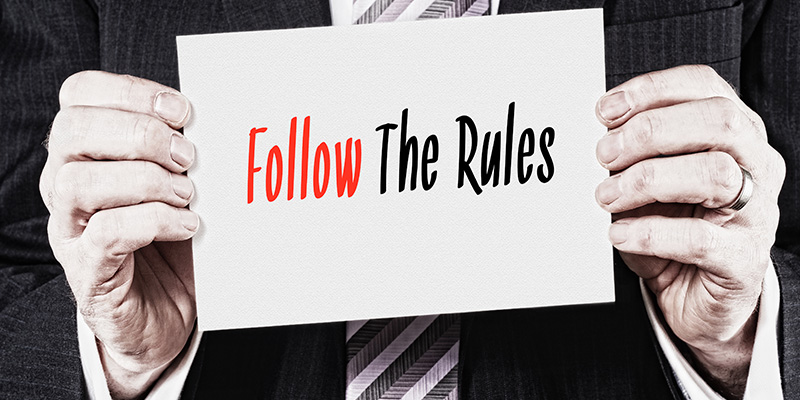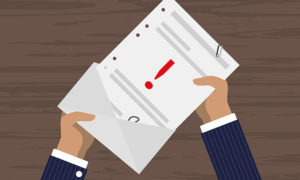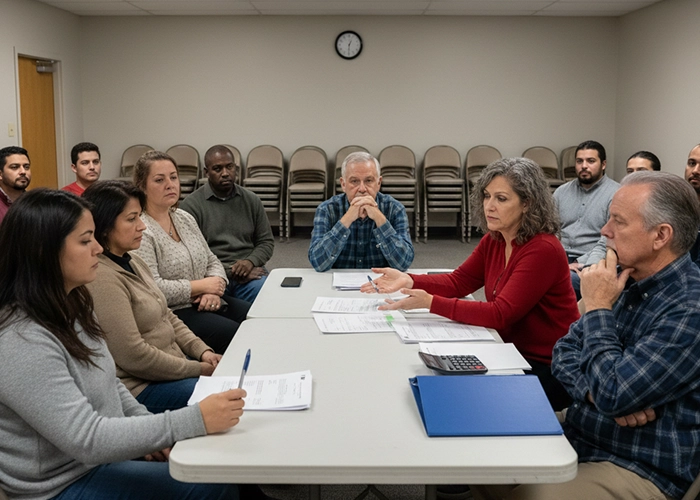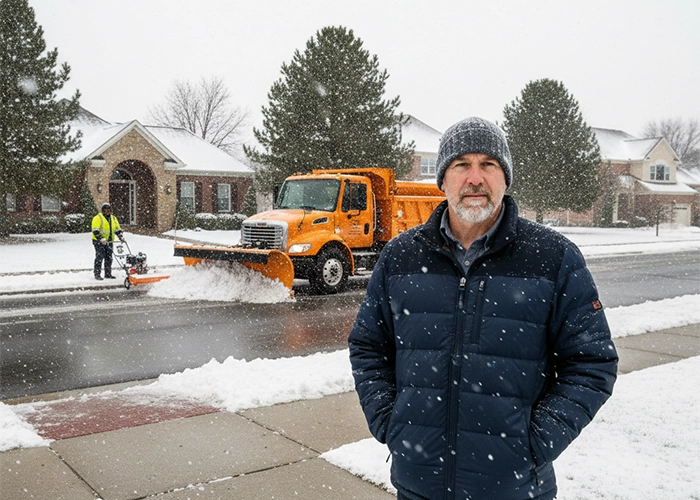A Step-by-Step Approach to Enforcing HOA Rules

Homeowners association rules and regulations exist in a community to keep everything in order and help maintain property values. But, what is the proper way of enforcing HOA rules effectively? Read on to find out.
Browse By Category
Sign up for Our Newsletter
Homeowners association rules and regulations exist in a community to keep everything in order and help maintain property values. But, what is the proper way of enforcing HOA rules effectively? Read on to find out.
How Can HOA Enforce Rules Properly
“No shirt, no shoes, no service.” “You break it, you bought it.” “Handicap parking only.” These are basic rules that we encounter and adhere to in our daily lives. Breaking these rules can sometimes get you in hot water, but what about breaking the rules of your community?
A community that is governed by a homeowners association will have its own governing documents, including the Declaration of Covenants, Conditions, and Restrictions (CC&Rs). Everyone who joins the community will receive the CC&Rs, along with the HOA rules and regulations and bylaws, all of which are needed to maintain orderly operations. Prospective homeowners must read all the rules and pledge to follow them.
However, most buyers not read all the HOA rules and regulations. They will only hone in on typical HOA rules or the ones that relate to them – like owning a pet or having a washing machine in their unit. Other stipulations are forgotten until one day, they receive a notice of violation. It might be too late to do anything else but deal with the association’s HOA rule enforcement process.
Can Homeowners Association Enforce Rules?
Enforcing homeowner association rules and covenants is a major responsibility of the HOA board. The association must enforce all rules fairly and uniformly. However, there have been instances of associations losing focus on this issue.
Both over-enforcing and under-enforcing can have significant consequences for your community. In some cases, it might be time for the non-board members to band together and clean the house.
If board members do not want to deal with rule enforcement and all the headaches that go with it, a great option would be to enlist the services of an HOA management company. In addition to other services, they can also handle enforcing HOA rules, sending violation notices, collecting fines, and pursuing legal action if necessary.
The Standard Steps for Enforcing HOA Rules
When enforcing HOA rules, all associations must follow a standard methodology. Usually, these procedures are outlined in your HOA’s bylaws and CC&R.
When a homeowner violates rules and regulations, they need to undergo due process within the association, as mentioned in the governing documents. While the process can differ per community, some of the common steps include the following.
1. HOA Board Discussion
There are instances when some reports can come off as a misunderstanding. Alternatively, there may be provisions in your governing documents that allow exemptions to rules, and that homeowner may meet those requirements.
Given these circumstances, it is important for the Board to meet and discuss the circumstances. When a report comes in or when one of the community enforcers finds violations done by homeowners, the board must first discuss it in a meeting. During this meeting, they must take a vote before acting upon it.
2. Issue a Warning
 The violation could be an honest mistake. The first step is to issue a warning. This should be in writing and include details of the specific violation. Hopefully, the resident will decry “mea culpa” and undo the mistake.
The violation could be an honest mistake. The first step is to issue a warning. This should be in writing and include details of the specific violation. Hopefully, the resident will decry “mea culpa” and undo the mistake.
In most cases, a warning is enough to keep homeowners on their best behavior. After all, a majority of residents don’t want to commit any violations. At the end of the day, being called out for a mistake is sufficiently humiliating.
However, some residents refuse to obey the rules and commit a second offense. For violators who create HOA nightmares, refer to the next tip.
3. Issue Penalties
If the homeowner continues to break the rules, even with multiple warnings and proper notices involved, the association can impose penalties as part of enforcing HOA rules. There are numerous ways HOAs can pursue this. Here are some of them:
Levy Fines
Consequences come with the territory of HOA rules enforcement. If a homeowner breaks a rule, they can face a monetary penalty. Most people get discouraged when money is involved, so fines work really well to deter violators.
However, the HOA must ensure that the amount they impose is within a reasonable bracket. A $100 fine seems too exaggerated for a small offense like failing to take down Halloween decorations on time. On the other hand, a fine too cheap might not make a significant difference.
Imposing fines is the most common consequence for non-compliance to HOA rules and regulations. But it’s not without difficulties. Some homeowners feel that they should not be obligated to pay a fine. However, the longer the fines go unpaid, the more penalties they incur. If violators are not careful, the HOA may decide to take legal action against them.
Suspend Rights and Privileges
Another course of action the HOA could take is to suspend the violator’s rights and privileges. Living in an HOA means residents get access to a variety of services and amenities like pools and clubhouses.
Homeowners also have the right to participate in votes. Revoking these privileges usually helps knock some sense into violators. Just make sure your association is acting within its authority — check your state laws and governing documents to avoid running into legal trouble.
Place a Lien
For serious cases of HOA rule violation, the HOA may be forced to place a lien on the homeowner’s property. This, then, could potentially lead to lawsuits or legal action. Placing a lien doesn’t guarantee that the HOA gets paid. However, if the homeowner decides to sell the property, the new owner might need to pay the lien settlement as part of the purchase.
Tip: If Your HOA Doesn’t Have One, It’s Time to Adopt a Standard Procedure
Enforcing rules isn’t easy, though adopting a standard procedure can simplify and streamline the process. Your governing documents (CC&Rs and bylaws) should contain specific details on how to deal with violations.
If you don’t have such procedures in place yet, it’s time to assume one. Check with your association’s attorney before putting your plan into action, though. This way, you can make sure you’re legally covered, too.
Tip: Say No to Selective Enforcement
Above all, the most important tip is to ensure uniform enforcement throughout the community. HOA rules enforced unequally are a big no-no. Bias and favoritism are your worst enemies here. As a member of the HOA board, you have a duty to enforce rules consistently and fairly. Don’t just pick out which rules are worth enforcing and which ones aren’t. It’s also a bad idea to give your neighbor a pass just because you owe them a favor or happen to be friends with them. That’s a recipe for legal disaster.
What Happens When HOA Rules are Not Enforced Properly?
How do you enforce HOA covenants and rules if the board members themselves are not compliant? Though the board members are in a position of power, don’t forget that they’re also homeowners. That means that they are not exempt from following HOA rules and regulations. They should even be held to higher standards due to their fiduciary duty to the HOA.
How to Enforce HOA Bylaws?
Bylaws are another important governing document in an HOA. Whereas covenants and rules focus on homeowner rights and responsibilities, HOA bylaws focus on the standards by which an association should be run or managed.
For example, the bylaws establish requirements for board meetings and the annual HOA meeting. There is also an emphasis on the specific duties, composition, and term limits of the HOA board.
What happens when board members don’t enforce HOA bylaws? This might mean not holding the monthly board meeting, failing to provide adequate notice for an upcoming meeting, ignoring quorum requirements during board elections, or extending tenure beyond the term limits. Failure to abide by the governing documents is a clear breach of board members’ fiduciary duties.
If you’re a homeowner or a fellow board member, it’s important to take action on board members who do not follow the bylaws, as well as other HOA rules and covenants. However, this does not necessarily mean filing a lawsuit right away. Here’s how to proceed with this sensitive matter.
1. Gather Evidence
Most HOAs will receive countless complaints in a single day — but not all of them have merit. To avoid getting lost in the shuffle, make sure that your own complaint is as detailed and as credible as possible.
Accusing a board member of negligence or misconduct is a very serious charge. As such, it’s important to gather as much evidence as you can. You can even list down witnesses who can provide testimony that will strengthen your complaint.
After submitting a written letter, give your management time to respond. If they do not respond within a reasonable time frame, take the next step.
2. Schedule a Private Meeting with the Board
Sometimes, board members are just too busy with other community matters. In that case, it’s a good measure to schedule an appointment with them. That way, they can devote the time needed to listen to your complaint. It may be that the board was simply unaware of the breach of HOA rules and regulations or bylaws.
Make sure that to bring a copy of the governing documents. You’ll be able to show the board the specific HOA rule or bylaw in question. As a courtesy, the complainant can allow the board some time to correct the issue at hand. If it does not seem like they are taking your complaint seriously or fail to act within a reasonable time, you may need to take further action.
3. Raise Issue During a Board Meeting
 Board meetings are open to homeowners — except for closed-door meetings where they discuss confidential matters. You can either request a specific action item on the board meeting agenda or raise your complaint during the open forum section of the board meeting.
Board meetings are open to homeowners — except for closed-door meetings where they discuss confidential matters. You can either request a specific action item on the board meeting agenda or raise your complaint during the open forum section of the board meeting.
Once you bring up your complaint during a board meeting, you may garner stronger support from other homeowners.
With a large majority of homeowners requesting action, the board may finally take the necessary steps to correct the problematic behavior. When it comes to unenforceable HOA rules, the board should file an amendment to your governing documents and make sure that the changes are recorded in the public records.
4. File a Lawsuit
If all other measures have failed, the complainant can always file a lawsuit. Take note that lawsuits can be quite costly and lengthy. That’s why we recommend this as the final step. However, if you’re dealing with a difficult board member, filing a lawsuit may be necessary. Make sure to document all previous steps taken, apart from evidence of the rule breach.
HOA board members are typically protected against personal liability in the case of lawsuits. However, this is only if they have acted in the best interests of the community. They can be held liable if the judge finds that they have breached their fiduciary duty to the HOA. For example, cases of discriminatory rule enforcement can be a violation of the Fair Housing Act, which would mean serious consequences for the offending board member/s.
Why HOA Rules Enforcement Is Necessary
Aside from knowing how to enforce HOA rules, it’s also important to know why HOA rule enforcement is necessary in the first place. Think of it this way: a homeowners association not enforcing rules is just like a country not enforcing the law. Chaos would reign and the association would descend into anarchy. Rule enforcement can be tricky, though, especially without the proper procedures and preparations. So, follow these tips on how HOAs can enforce rules and regulations, and you’ll be good to go.
For those who need further guidance on HOA rule enforcement, it’s always good to consult with an experienced management company. If you’re on the hunt for one, make sure to visit the HOA Management online directory for the best HOA management companies and vendor services in your area!
RELATED ARTICLES:
- The Ins And Outs Of Covenant Enforcement For Your HOA
- What Are HOA Disputes? How To Practice Dispute Resolution?
- HOA Attorneys – Why They Are Important and How To Find One
Trending Now
Related Article
Sign up for Our Monthly Newsletter
Sign up below for monthly updates on all HOA Resource















